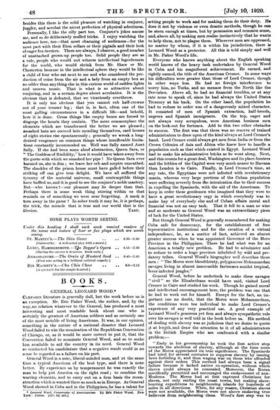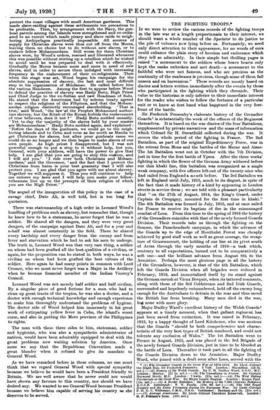BOOKS.
GENERAL LEONARD WOOD.* CAMPAIGN literature is generally dull, but the work before us is an exception. Mr. Eric Fisher Wood, the author, and, by the way, no relation whatever to the General, has produced a most interesting and most readable book about one who is certainly the greatest of American soldiers and as certainly one of the most notable of living Americans. It was, in our opinion, something in the nature of a national disaster that Leonard Wood failed to win the nomination of the Republican Convention ef Chicago, or, as it would be more correct to put it, that the Convention failed to nominate General Wood, and so to make him available to aid the country in its need. General Wood so conducted his candidature that a negative result could in no sense be regarded as a failure on his part.
General Wood is a sane, liberal-minded man, and at the same time a typical American of the best type, and there is none better. By experience as by temperament he was exactly the man to help put America on the right road ; to combine the warring elements, and to carry out on a firm basis the recon- struction which is wanted there as much as in Europe. As General Wood showed in Cuba and in the Philippines, he has a talent for
• Leonard Wood. Conservator of Americanism. By Brie Fisher Wood. New York: Doran. [12e. 6d. net.]
setting people to work and for making them do their duty. He does it not by violence or even drastic methods, though he can be stern enough at times, but by persuasion and common sense, and, above all, by making men realise instinctively that he wants to help them, not to plague them. Wherever men are oppressed, no matter by whom, if it is within his jurisdiction, there is Leonard Wood as a protector. All this is told simply and well in Mr. Fisher Wood's life.
Everyone who knows anything about the English speaking world knows of the heavy task undertaken by General Wood in Cuba and his magnificent achievement. He earned, and rightly earned, the title of the American Cromer. In some ways his difficulties were greater than those of Lord Cromer. though in other ways less. He had no foreign interference to worry him, no Turks, and no menace from the North like the Dervishes. Above all, he had no financial troubles, or at any rate none to speak of, since he had always the United States Treasury at his back. On the other hand, the population ho had to reduce to Order was of a dangerously mixed character. It consisted of men of Spanish extraction, half-breeds, negroes and Spanish immigrants. On the top, eager and not always very scrupulous, were American business men on the look-out for fortunes. Add to this two other obstacles to success. The first was that there was no reserve of trained administrators to draw upon of the kind always at Lord Cromer's hand. Lord Cromer could always get men from India or from the Crown Colonies of Asia and Africa who knew how to handle a population such as that which existed in Egypt. Leonard Wood had to make his administrative bricks as he went along. Next, and this counts for a great deal, Washington and its place-hunters and the lobbies of the Capitol were very much nearer to Havana than London is to Cairo. Finally, in Lord Cromer's time, at any rate, the Egyptians were not infected with revolutionary mania, whereas very large portions of the Cuban population were suffering severely from the intoxication due to their success in expelling the Spaniards, with the aid of the Americans. To keep in order these gentlemen who imagined that they were to have a great revolutionary orgy in which everybody was to make hay of everybody else and of Cuban affairs moral and financial was not an easy task. That it fell to a man so wise and BO moderate as General Wood was an extraordinary piece of luck for the United States.
But though General Wood is generally remembered for making Cuba safe for democracy, for the establishment of free representative institutions and for the creation of a virtual independence, he, as a matter of fact, achieved an almost greater success when he was appointed Governor of the Moro Province in the Philippines. There he had what was for an American a totally new problem. He had to administer and to reduce to order a huge province inhabited by wild and pre- datory tribes. General Wood's biographer well describes these men : "The Moms were bloodthirsty, polygamous Mohammedan savages living in almost inaccessible fastnesses amidst tropical, fever-infected jungles."
General Wood, before he undertook to make these savages " civil " as the Elizabethans would have said, visited Lord Cromer in Cairo and studied his work. Though he gained moral and intellectual encouragement here, the problem was one that he had to work out for himself. Except for the fact, an im- portant one no doubt, that the Mores were Mohammedans, the conditions were too individual to make Lord Cromer's experience of any very practical use. A good example of Leonard Wood's generous yet firm and always sympathetic rule over his savages is well told in the book before us. His method of dealing with slavery was so judicious that we desire to quote it at length, and draw the attention to it of all atheinigtrators in the British Empire who are confronted with a similar problem :— "Early in his governorship he took the first active step towards the abolition of slavery, although at the time none of the Mores appreciated its true significance. The Spaniards had tried for several centuries to suppress slavery by issuing laws forbiding it, and then waging war on those who offended against their orders This method had always been a signal failure because it lacked native co-operation, without which slaves could always be concealed. Moreover, the Koran specifically permitted and encouraged the enslavement of non. Moslems. The Moms had at first captured Christians for slaves, not only raiding the coast towns, but making slave- hunting expeditions to neighbouring islands for hundreds of miles in all directions. When, for any reason, Christian slaves were not available, the Moroi; were not above enslaving true believers from neighbouring clans. Wood's first step was to protect the coast villages with small American garrisons. This made slave-raiding against these settlements too precarious to be profitable. Then, by arrangement with the Navy, the gun- boat patrols among the Islands were strengthened and co-ordin- ated to an extent which made piracy and slave raids to neigh- boring Archipelagos practically impossible. All sources of supply for Christian slaves were thus cut off from the Mores, leaving them no choice but to do without new slaves, or to enslave fellow Mohammedans. Still worse for them Christian slaves were, by Wood's orders, rescued and liberated whenever this was possible without stirring up a rebellion which he wished to avoid until he was prepared to deal with it effectively. Gradually the Moros became more and more in need of new slaves, and in order to secure them indulged with increasing frequency in the enslavement of their co-religionists. Then when the stage was set, Wood began his campaign for the absolute suppression of slavery, the last and most difficult step in his organization of Mindanao. He called before him the various Headmen. Among the first to appear before Wood to defend the practice of slavery was Hadji Butu, High Priest and Chief Judge to the ex-Sultan and new Headman of Sulu. He stated that the Americans had by solemn treaty agreed to respect the religions of the Filipinos, and that the Moham- medan religion distinctly encouraged slaveholding. 'That is true,' said Wood, the law 'ef the Prophet Mohammed author- izes slavery, but the Kitab of the Koran forbids the enslavement of true believers, does it not?' Hadji Butu nodded uneasily. ' Yet to-day the majority of the slaves held by your master are Mohammedans.' Hadji Butu nodded again, and explained : 'Before the days of the gunboats, we could go to the neigh- boring islands and to Cebu and even as far north as Manila to get Christians for slaves, but after your gunboats came we could do so no longer and we then began to make slaves of our own people. As high priest I disapproved, but I was not powerful enough to put a stop to it without help, but you, General, with your soldiers, will have the power to give that help. I am glad that you are going to stop this custom, and I will aid you." I rule over both Christians and Moham- medans,' said the Governor, and the fact that I protect the Christians from harm is your best guaranty that I will also protect you. I am glad that you agree with me about slavery. Together we will suppress it. Thus you will continue to help me enforce my laws and I will help you make your fellow- tribesmen live up to the precepts of their religion of which you are the High Priest.'" The sequel of the inauguration of this policy in the case of a savage chief, Date Ali, is well told, but is too long for quotation.
There was statesmanship of a high order in Leonard Wood's handling of problems such as slavery, but remember that, though he knew how to be a statesman, he never forgot that he was a soldier. He shared all the dangers, and they were very great dangers, of the campaign against Date Ali, and for a year and a-half was almost constantly in the field. There he shared every hardship and every danger from the enemy and from fever and starvation which he had to ask his men to undergo. The truth is, Leonard Wood was that very rare thing, a soldier on whom had been grafted all the best qualities of a civilian, or again, for the proposition can be stated in both ways, he was a civilian on whom had been grafted the best virtues of the soldier. Here again he had many points in common with Lord Cromer, who we must never forget was a Major in the Artillery when he became financial member of the Indian Viceroy's Council.
Leonard Wood was not merely half soldier and half civilia,n, By a singular piece of good fortune for a man who had to clean up great tracts of the tropics, he was also a doctor, and a doctor with enough technical knowledge and enough experience to make him thoroughly understand the problems of hygiene. The doctor side of Wood helped him immensely in his great work of extirpating yellow fever in Cuba, the island's worst curse, and also in putting the Moro province of the Philippines to rights.
The man with these three sides to him, statesman, soldier and hygienist, who was also a sympathetic administrator of natives, would have been admirably equipped to deal with the great problems now waiting solution by America. Once more we say that the Republican Convention made a great blunder when it refused to give its mandate to General Wood.
.As we have remarked before in these columns, no one must think that we regard General Wood with special sympathy because we believe he would have been a President friendly to Britain. We are well aware that he never could nor would have shown any favours to this country, nor should we have desired any. We wanted to see General Wood become President because we believe him capable of serving his country as she deserves to be served. -



































 Previous page
Previous page